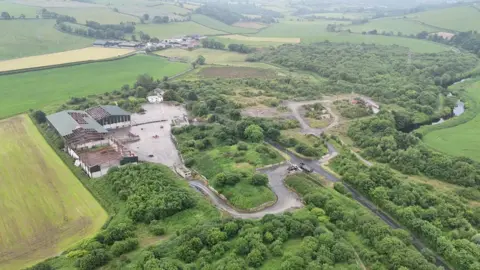'Significant improvement' needed to deter waste crime, says auditor
 BBC
BBCA damning report into the regulation of the waste industry here said the Northern Ireland Environment Agency's (NIEA) approach requires "significant improvement" to effectively identify and deter crime.
The investigation by the Northern Ireland Audit Office found the potential profits from waste crime "far outweigh" the sanctions, and that current measures "are not achieving best value for money".
It adds that waste crime could be estimated to cost around £34m per year, when costs of rectifying environmental and social harm, evaded taxes, and lost legitimate business are taken into account.
It said cleaning up illegal dumping is a "significant cost" to the public purse.
The Auditor General found that no inspections to match waste materials arriving and leaving sites, or to verify waste on-site, have been conducted in the last two years.
Dorinnia Carville said she had identified "underlying operational challenges" facing the NIEA, including poor data collection and management information, and recruitment issues.
She said only two of the 36 legal cases taken in the past five years had resulted in environmental restoration by the defendant.
"The current operation of the inspection regime does not adequately identify or discourage criminality," she continued.
"Legal enforcement activities, even when successful, rarely result in polluters remediating the damage caused.
"Furthermore, financial penalties through fines and confiscation orders are a fraction of the costs of dealing with the waste legally."
She has recommended "a review of existing arrangements and inspection regimes" to ensure better value for money and more effective environmental protections for Northern Ireland.
The report points to the Mobuoy site, which the most reliable estimate suggests will cost £107m to clean up.
That cost is expected to "largely" fall to the public sector.
'300,000 tonnes of waste disposed of annually'
The Department of Agriculture, Environment and Rural Affairs (Daera) has overall responsibility and accountability for the regulation of waste.
The NIEA authorises all activities involving the treatment, movement, storage or disposal of waste and is responsible for clean-up costs when it involves hazardous waste on public land or where the volume exceeds one bin lorry load.
A report commissioned in 2013 to include lessons from Mobuoy made 14 recommendations.
While the NIEA said 13 were acted on, the Auditor's report identifies several instances where the same issues are still prevalent.
These include not monitoring illegal sites after court cases conclude, and a lack of specialist skills.
The Auditor also criticised NIEA's lack of data on the nature, source and volume of output of each waste stream it is responsible for regulating.
A 2015 estimate suggested the amount of waste deposited illegally in Northern Ireland annually was 300,000 tonnes.
That is the most recent figure available.
The Daera Minister, Andrew Muir, said: "Waste crime poses a serious threat to our environment, to public health and to the integrity of our waste management systems.
"It also undermines law-abiding operators and damages public confidence."
He said that strengthening our environmental governance structures is a top priority.
Muir added that it is important that "a clear response to each recommendation is formulated, published and then implemented."
